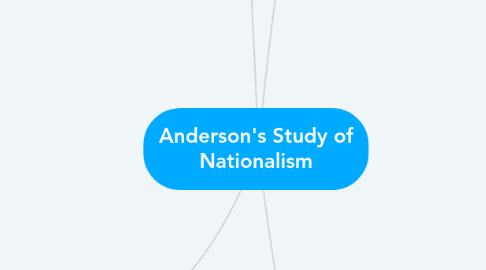
1. The Origins of National Consciousness
1.1. Print Capitalism
1.1.1. The formation of “horizontal-secular, transverse-time” national communities
1.1.2. Booksellers began publishing in vernacular.
1.1.3. Novels and newspapers were able to spread and influences the thinking.
1.1.4. Promotes literacy to the masses.
1.2. Protestant Reformation
1.2.1. A movement in 1500's that splintered Catholic Europe.
1.2.2. To fight “religious propaganda war”
1.3. Standardization of Languages
1.3.1. Print helped consolidate diverse dialects into common standardized version of languages.
1.3.2. The process became a tool to repress minorities and impose a sense of uniform national consciousness.
1.3.3. Publishers chose a standard dialect to print in, one that would be accessible to their whole audience.
2. Creole
2.1. New Latin American States
2.1.1. Creoles (European-descended but colonial-born)
2.1.1.1. Once held significant power
2.1.1.2. Helped Spain control and exploit local native populations
2.1.1.2.1. White creoles intermarried creating mixed-raced population
2.1.1.3. Prohibited from interacting beyond their own colonies’ capitals
2.1.1.3.1. Identities formed on that of individual colonies and not as a whole.
2.1.2. How it was formed in the Americas in the 18th and 19th Century
2.1.2.1. Independence movements were led by the elites and not the masses
2.1.2.1.1. Elite Classes seizing power from one another
2.1.2.1.2. Elites feared the violent revolt of the masses
2.1.2.1.3. Independence leaders were pro-slavery
2.1.3. Factors of the emergence of independent states in Latin America
2.1.3.1. Colonized elites
2.1.3.1.1. Shared language with their colonizers
2.1.3.1.2. Spanish Empire’s increasingly strict policies
2.1.3.1.3. Transmission of European philosophies
2.1.3.1.4. Belief to travel and imagine as being unified as they travelled the same way, same place, and for the same reason like pilgrimage
2.1.3.2. Newspapers in Spanish Colonies
2.1.3.2.1. Printing presses were strictly controlled by the crown and church until the end of the 1600s
2.1.3.2.2. Newsworthy informations were only favorable to elites involved in colonial administration
2.1.3.2.3. Created possibilities for revolution within each Spanish colony
2.1.3.2.4. Divided the colonies by aiding to construct their own unique identity
2.1.3.2.5. Created an imagined community among fellow readers.
2.1.3.3. Existence of economic, administrative, and technological integration
2.1.3.3.1. Defined the communities imagined by those living within these territories
2.1.3.3.2. Foundation through guiding principles of:
3. Concept of Nations
3.1. Nation as a Cultural Construct
3.1.1. History rooted in the 18th century
3.1.1.1. Fall of monarchies and empires
3.1.1.2. Literacy, technology, and capitalism
3.1.2. Universally legitimate political value
3.1.2.1. nation vs. nationality vs. nationalism
3.1.3. Uncomfortable anomaly for Marxist theory
3.1.3.1. Anomaly as dominance
3.1.3.1.1. nationalism is so powerful/ “anomalous”
3.1.3.2. “Copernican” rethinking
3.1.3.2.1. revolutionary and controversial rethinking
3.1.3.2.2. forcing people to totally change their perspective on nations
3.2. Nation as a Form of Political Organization
3.2.1. Normal, natural, inevitable.
3.2.2. Three Paradoxes
3.2.2.1. Nations are a new phenomenon to historians.
3.2.2.2. Nation is both a universal concept and an “irremediably particular” one.
3.2.3. Arguments
3.2.3.1. Nation is an idea not a thing
3.2.3.2. Nationalism is not an intellectual idea, but an emotional one
3.2.3.3. All nationalism is the same
3.3. Nation as Cultural and Emotional Phenomena
3.3.1. Nationalism over Marxism
3.3.2. Historical grievances and concepts of ethnic identity get in the way of their long-term political goals.
3.3.3. “Nobody would die for the idea of liberalism, but thousands of people die for their nations every year.”
3.4. Nation as an Imagined Political Community
3.4.1. Imagined Communities
3.4.1.1. Anderson does not contrast “imagined” with “real”
3.4.2. Nation imagined as both inherently limited and sovereign
3.4.2.1. Members are still considered as part of the group even if they will never know most of each other
3.4.2.2. Everyone assumes everyone else belongs to one
4. Cultural Roots
4.1. Replaced Cultural Conceptions
4.1.1. Sacred Scriptures
4.1.1.1. Declined due to intercontinental travel and print capitalism
4.1.1.2. Sense of belonging via religious symbols
4.1.2. Dynastic Realm
4.1.2.1. Divine
4.1.2.2. Royalty
4.1.2.3. Declined due to revolutions of the plebeians
4.1.3. Concept of Time
4.1.3.1. Messianic time
4.1.3.2. Homogeneous, empty time
4.1.3.2.1. Parallel to the nation
4.1.3.2.2. Novels including Noli me Tangere, El Periquillo Sarniento, Semarang Hitam
